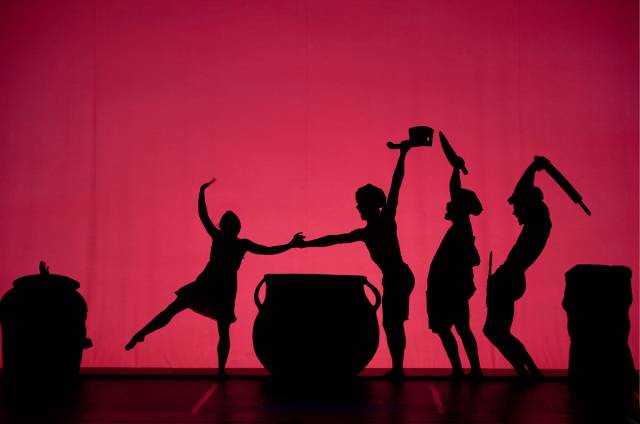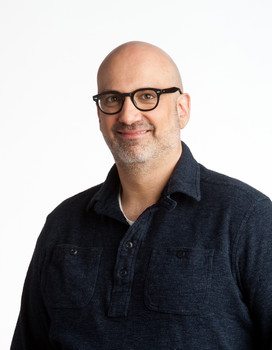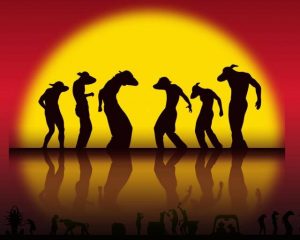
 World-renowned dance company Pilobolus premieres Shadowland later this month at the NYU Skirball Center for the Performing Arts. We talked to Executive Director Itamar Kubovy about the show, the company’s process, and what’s in store for the future.
World-renowned dance company Pilobolus premieres Shadowland later this month at the NYU Skirball Center for the Performing Arts. We talked to Executive Director Itamar Kubovy about the show, the company’s process, and what’s in store for the future.
What was the inspiration for Shadowland? Was there something specific that sparked this idea?
A number of years ago, I got a call from a guy who works for an advertising agency. He said, “Can you guys make a car commercial without a car in it?”
And we said “Sure, let’s try.” And we did this commercial for Hyundai. And shortly after that, we ended up doing a bunch of little pieces on the Oscars. And that led us to all sorts of requests and assignments from kings and queens and sheiks and corporations in more than 30 countries. And they all wanted us to create these little humorous shadow dances for them. It was supplementary work that funded all the new work and experimentation for the company.
But then we realized, after a bunch of time, that maybe there is a way to put together some of the stuff that we have been working on and to put it together in a way that actually allows us to tell a story and make a dance that is to our own passion, rather than to somebody else’s design or commission. And that was Shadowland.
We decided that the story we would try to tell would really be a kind of surrealistic coming of age story...for a young, adolescent girl who imagines her own independence. It took us a really long time. It was very hard to actually try to make these things start to resonate emotionally and have some depth.
We were very interested in how to tell the story visually. It’s all done through physical movement and bodies, and there’s really no tech. So we turned to a guy named Steven Banks, who was the head writer for SpongeBob Squarepants, because we thought there was a lot of really efficient, focused storytelling in that show that is really done through visual means, rather than through lots of dialogue.
And then we went to a real favorite indie rock composer of ours, David Poe, who wrote a really beautiful score. 80 minutes of music. Some of it is really cinematic, and some of it is really singer-songwriter songs that end up helping the audience feel their way into the psyche of this girl.
It kind of was a magical thing as it came together. It’s a real pleasure, and we’re excited, to be able to share it with the people who have watched us for a long time.
 Shadowland has had huge success abroad. What do you think has contributed to that?
Shadowland has had huge success abroad. What do you think has contributed to that?
I think that because shadow is the medium, there’s a very strong response to the dream imagery that feels familiar to people in a certain way. I think it’s open enough, and the music is a big piece too, to allow people to throw their own associations and their own story onto the details. We’re providing a structure that people can find a lot to respond to.
It’s pretty incredible what shadows can do, and what we’ve been able to discover about that has to do with this amazing precision between the dancers. It appeals, on a pure illusionistic level, and it ends up being a very evocative medium too, in terms of people having associations and being able to connect to it.
Pilobolus has always emphasized collaboration. How has the International Collaborators Project that you formed driven Pilobolus’ work as a whole?
We always say that our work is really the result of the people who are in the room at the time. Having the conversations and doing what they did. In a way, the dance is just a record of the time spent making the dance. We found that the best way to influence what comes out is to bring a new group of people into the room to make what it is that you want to make together.
So we started thinking about the people either in the dance world or not in the dance world, that we could bring in and spend time with. Not setting a piece on us or making a piece for us, but for us to get to know that person in this act of creation. And we’ve done that now almost 20 times over the last ten years or so. Everyone from Basil Twist, the puppeteer, to Penn and Teller, to MIT robotics...it’s a pretty long list of people now.
I think it’s just been fantastic. The pieces, some of them have been phenomenal. And the endeavor is really awesome. It’s allowed us to really think about collaboration and what’s possible and what’s not— and what makes it work and what doesn’t make it work.
It’s also just allowed for diversity to maintain itself in the world. Different ideas, different directions. Different ideas and senses of humor. And I’ve always felt like the greatest asset of Pilobolus was its diversity. That there was never just one choreographer or one vision. That there were a lot of different ideas in the room. And I think that’s what’s kept the company interesting for many decades.
If we can hold on to a way for people to work together and make things, then that will be very distinctive into the future, I think, in addition to having amazing people come in and actually making the stuff.
You’ve done some really interesting collaborative things over the past ten years. Can you tell me a little bit more about where you see the company evolving to, in terms of transcending collaboration?
The work we do is really understanding the possibility of collaboration and the human body. Understanding how people get along and what the community is like.
What makes us different from a lot of other instances of collaboration is that we really believe in people being involved broadly in the work. If you’re a musician you’re not just doing music. You’re involved in story meetings and structure and response and costumes. There’s an interest in working with you fully, as an artist. That gives people an opportunity to think about crazy ideas they’ve had that don’t pertain to the main work that they normally do.
In that cross-pollination, there’s an enormous amount of innovation that’s waiting to happen in all sorts of fields. Thinking of these curatorially—who are the people in the modes and the fields and worlds that we want to bring together in interesting ways? That’s a future. We’re now thinking about a real place where that can happen. Where it doesn’t always necessarily result in a piece we tour, but in a whole bunch of different levels of projects.
 The body and the expression of the body exists in a lot of different forms. Movement is powerful in a lot of different contexts that I think go beyond the limits of what’s defined as dance, not that that’s not a very broad range of things in and of itself.
The body and the expression of the body exists in a lot of different forms. Movement is powerful in a lot of different contexts that I think go beyond the limits of what’s defined as dance, not that that’s not a very broad range of things in and of itself.
I think, sometimes, not limiting oneself by thinking about physical movement as “dance,” you’re able to recognize the ways in which patterns and trance and improvisational energy and partnering and all those things exist in so many different fields. And to understand that more basically, more humanly, is a big part of what Pilobolus is interested in.
It’s not just limited to dancers, to think and work creatively the way we do.
Your background is in film, TV, and theatre. What really drew you to this position with Pilobolus?
I just love the opportunity to work with the same group of people consistently over time.
People hire a pick-up company or hire a group of actors to make a film or a group of actors to make a play or whatever it may be. And that group forms just around that piece. And I’ve always thought that the idea of being able to live with the same group of people over and over again, telling lots of different stories is just an awesome opportunity. Pilobolus is one of the few places where that can really happen.
In this time of unbelievable tech and mediation, and the fact that we’re all sitting and looking at ourselves and each other, often through screens, the idea of a live physical body touching other live physical bodies as a way of expression... It seemed like that stuff was going to get more and more precious to me.
Because we’re so much removed from it, there’s something really exciting about being able to watch bodies in action. I think looking at what one can really do with that kind of primarily physical, nonverbal language and communication seemed super interesting.
Pilobolus will perform "Shadowland" at the NYU Skirball Center November 20 through December 6.